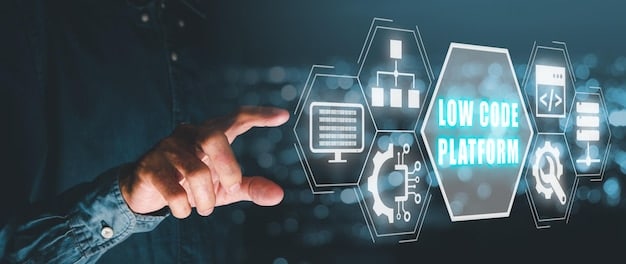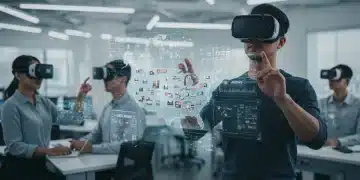AI-Powered Education: Reshaping US Workforce Training by 2025

AI-powered personalized education is poised to revolutionize US workforce training by 2025, offering customized learning experiences that adapt to individual needs, accelerate skill acquisition, and enhance overall workforce readiness for the rapidly evolving job market.
The integration of artificial intelligence into personalized education is not just a futuristic concept; it’s rapidly becoming a key factor in reshaping workforce training in the United States. How Will AI-Powered Personalized Education Reshape US Workforce Training by 2025? This question is at the forefront of discussions among educators, business leaders, and policymakers alike, as they seek to prepare the American workforce for the challenges and opportunities of tomorrow.
The Rise of AI in Personalized Learning
Artificial intelligence is no longer a futuristic fantasy; it’s transforming various sectors, and education is no exception. Personalized learning, powered by AI, tailors educational content and delivery to meet the specific needs and learning styles of individual students.
By analyzing data on student performance, identifying knowledge gaps, and adapting to individual learning paces, AI-driven platforms can optimize the learning experience, making it more effective and engaging. This approach promises to significantly improve workforce training outcomes in the US by 2025.
Adaptive Learning Platforms
Adaptive learning platforms are at the core of AI-powered personalized education. These platforms continuously assess a student’s understanding and adjust the difficulty level and content accordingly.
This ensures that learners are always challenged but not overwhelmed, leading to a more efficient and effective learning process.
AI-Driven Content Creation
AI is also being used to create highly relevant and engaging educational content. By analyzing industry trends and skill demands, AI can generate training materials that are up-to-date and directly aligned with workforce needs.
This eliminates the need for outdated textbooks and generic courses, ensuring that learners acquire skills that are immediately applicable in the workplace.
- Enhanced engagement and motivation through personalized content.
- Improved knowledge retention due to tailored learning paths.
- Faster skill acquisition driven by adaptive learning techniques.
- Greater accessibility to education and training for diverse learners.
In conclusion, the rise of AI in personalized learning represents a paradigm shift in education and workforce training. By providing adaptive, relevant, and engaging learning experiences, AI has the potential to transform how individuals acquire skills and prepare for the future of work.

Addressing the Skills Gap in the US Workforce
The skills gap in the US workforce is a growing concern, with many employers struggling to find qualified candidates to fill open positions. This gap is often attributed to a mismatch between the skills being taught in traditional education and the skills demanded by today’s employers.
AI-powered personalized education offers a promising solution to this problem by providing targeted training that aligns with specific industry needs and helps individuals acquire the skills they need to succeed.
Identifying Skill Deficiencies
AI algorithms can analyze job market data to identify emerging skill demands and pinpoint areas where the workforce is lacking.
This information can then be used to develop targeted training programs that address these specific skill deficiencies, ensuring that learners acquire the skills that are most in demand.
Customized Training Programs
Personalized education allows for the creation of customized training programs that cater to the unique skill requirements of different industries and job roles.
This ensures that learners are not wasting time on irrelevant material but are instead focused on acquiring the specific skills they need to excel in their chosen field.
- Reduced time and cost associated with traditional training methods.
- Improved alignment between training content and industry needs.
- Increased workforce readiness through targeted skill development.
- Greater opportunities for individuals to advance in their careers.
In summary, AI-powered personalized education can play a crucial role in addressing the skills gap in the US workforce by providing targeted training that aligns with specific industry needs and helps individuals acquire the skills they need to succeed. This approach promises to create a more skilled and competitive workforce, driving economic growth and innovation.
The Impact on Different Industries
The impact of AI-powered personalized education will be felt across various industries in the US, as organizations seek to upskill and reskill their workforce to adapt to technological advancements and changing market demands.
From healthcare to manufacturing to technology, personalized education can provide tailored training solutions that enhance workforce productivity and competitiveness.
Healthcare
In the healthcare sector, AI can be used to train medical professionals on new procedures, technologies, and treatment protocols.
Personalized learning platforms can adapt to individual learning styles and knowledge levels, ensuring that healthcare providers receive the training they need to deliver high-quality patient care.
Manufacturing
In manufacturing, AI can be used to train workers on advanced manufacturing techniques, automation systems, and robotics.
This can help manufacturers improve productivity, reduce costs, and maintain a competitive edge in the global market.

The technology industry has been revolutionized over the past few years and continues to progress. By using AI, workers can train on new technology and improve.
- Improved workforce productivity and efficiency in various industries.
- Enhanced quality and safety in healthcare and manufacturing.
- Greater innovation and competitiveness in the technology sector.
- Increased adaptability to changing market demands.
In conclusion, the impact of AI-powered personalized education will be transformative across different industries in the US. By providing tailored training solutions that address specific industry needs, AI can help organizations upskill and reskill their workforce, improve productivity, and maintain a competitive edge.
Overcoming Challenges and Ensuring Ethical Implementation
While AI-powered personalized education holds immense potential, it also presents challenges that must be addressed to ensure its effective and ethical implementation. These challenges include data privacy concerns, algorithmic bias, and the need for human oversight.
By proactively addressing these challenges, stakeholders can harness the full potential of AI-powered personalized education while mitigating potential risks.
Data Privacy and Security
Protecting student data privacy and security is paramount. Stringent measures must be implemented to safeguard sensitive information from unauthorized access or misuse.
Transparency and control over data collection and usage are essential to building trust and ensuring ethical practices.
Algorithmic Bias
AI algorithms can inadvertently perpetuate or amplify existing biases if not carefully designed and monitored. It is crucial to ensure that algorithms are fair, unbiased, and do not discriminate against any particular group of learners.
Regular audits and evaluations can help identify and address potential biases in AI-powered learning platforms.
Inclusivity and diversity must be considered when creating and monitoring new algorithms.
Effective implementation requires a thoughtful approach that considers both the technological aspects and the ethical implications. It is important to think about the future of learning and the implementation process as well.
In conclusion, overcoming challenges and ensuring ethical implementation are essential for realizing the full potential of AI-powered personalized education. By prioritizing data privacy, mitigating algorithmic bias, and fostering human oversight, stakeholders can ensure that AI is used responsibly and ethically to improve workforce training outcomes in the US.
The Role of Government and Policy
Government and policy play a crucial role in shaping the future of AI-powered personalized education in the US. Policymakers can create a supportive environment for innovation, address ethical concerns, and ensure equitable access to these transformative technologies.
Strategic investments, regulatory frameworks, and collaborative partnerships are essential for maximizing the benefits of AI-powered personalized education for the US workforce.
Funding and Investment
Government can invest in research and development to advance AI-powered personalized education technologies and support their deployment in workforce training programs.
This investment can help accelerate innovation, improve the effectiveness of training programs, and expand access to these opportunities for all Americans.
Regulatory Frameworks
Policymakers can establish regulatory frameworks that address data privacy, algorithmic bias, and other ethical concerns related to AI-powered personalized education.
These frameworks can help ensure that AI is used responsibly and ethically, protecting the rights and interests of learners while fostering innovation.
Public-Private Partnerships
Government can foster public-private partnerships to promote collaboration between educational institutions, industry stakeholders, and technology providers.
A collaborative effort is needed to improve the growth of the US workforce.
- Accelerated innovation in AI-powered personalized education technologies.
- Equitable access to transformative learning opportunities for all Americans.
- Responsible and ethical use of AI in workforce training.
- A more skilled and competitive US workforce.
In summary, the role of government and policy is critical in shaping the future of AI-powered personalized education. By providing funding and investment, establishing regulatory frameworks, and fostering public-private partnerships, policymakers can help ensure that AI is used effectively and ethically to improve workforce training outcomes in the US.
Preparing for the Future: A Call to Action
As we look ahead to 2025 and beyond, it is clear that AI-powered personalized education will play an increasingly important role in shaping the US workforce. To prepare for this future, it is essential for educators, business leaders, policymakers, and individuals to take proactive steps.
Collaboration, innovation, and a commitment to lifelong learning are essential for harnessing the full potential of AI-powered personalized education and building a more skilled and competitive workforce.
Embrace Lifelong Learning
Individuals must embrace a mindset of lifelong learning, recognizing that skills and knowledge must be continuously updated to remain relevant in a rapidly changing job market.
AI-powered personalized education can provide individuals with the tools and resources they need to adapt to new challenges and opportunities throughout their careers.
Foster Collaboration and Innovation
Educational institutions, industry stakeholders, and technology providers must collaborate to develop innovative training programs that meet the evolving needs of the workforce.
By sharing knowledge, resources, and best practices, stakeholders can accelerate innovation and create more effective and engaging learning experiences.
AI can allow individuals to develop a more competitive mindset and skills. It is important to find the right tools to succeed in the coming years.
In conclusion, preparing for the future requires a concerted effort from all stakeholders. By embracing lifelong learning, fostering collaboration and innovation, and promoting equitable access to AI-powered personalized education, we can build a more skilled and competitive workforce that is prepared to thrive in the years to come.
| Key Point | Brief Description |
|---|---|
| 🤖 Personalized Learning | AI customizes education for individual needs, improving engagement. |
| 🎯 Addressing Skills Gap | AI identifies workforce needs and delivers targeted training. |
| 💼 Impact Across Industries | Healthcare, manufacturing, and tech benefit from specialized training. |
| 🛡️ Ethical Implementation | Data privacy, bias, and human oversight must be carefully considered. |
FAQ
▼
AI personalizes education by assessing individual learning styles and adapting content. This ensures that learners receive tailored and effective training experiences.
▼
The skills gap is the mismatch between available jobs and qualified workers. AI helps by identifying skill deficiencies and providing targeted training programs.
▼
Healthcare, manufacturing, and technology industries benefit greatly. They gain enhanced quality, safety, improved productivity, and increased adaptability.
▼
Ethical concerns include data privacy, algorithmic bias, and the need for human oversight. Addressing these issues ensures responsible and ethical AI use.
▼
Government policies shape AI education through funding and regulations. These help with innovation and ensure equitable access and responsible AI use in education.
Conclusion
In summary, the integration of AI into personalized education promises to transform US workforce training by 2025. By addressing the skills gap, enhancing learning outcomes, and ensuring ethical implementation, AI-powered personalized education can create a more skilled, competitive, and adaptable workforce for the future.





